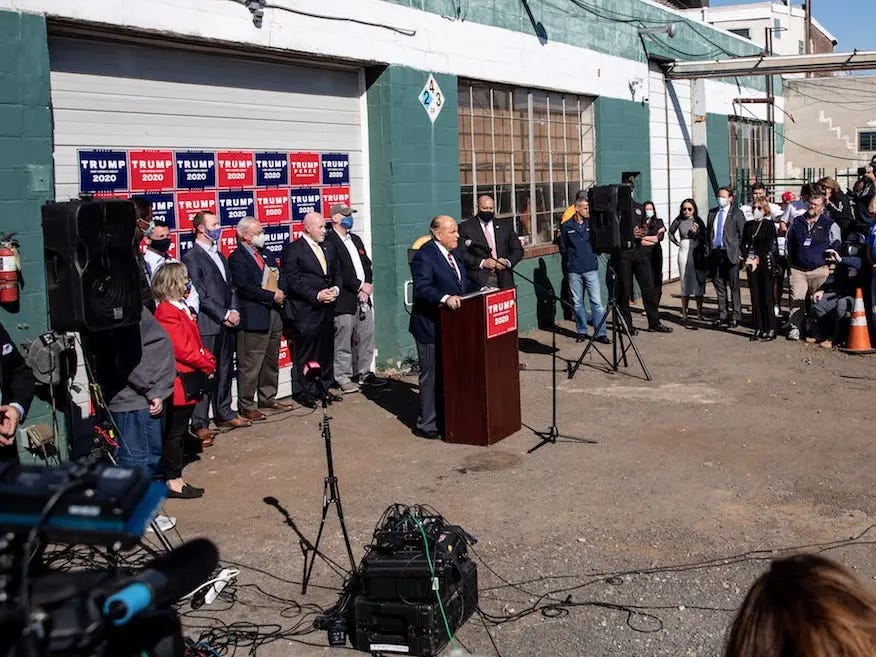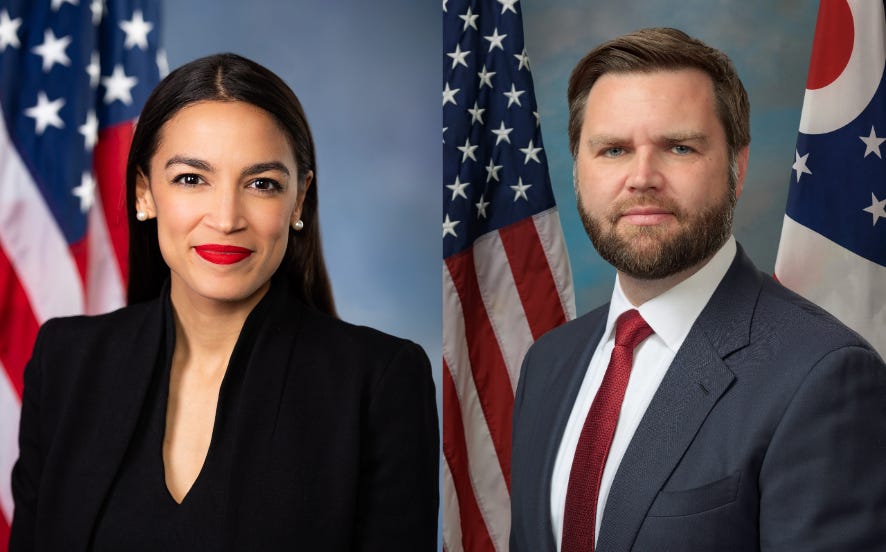The left-right spectrum has been the primary lens that we view politics through for quite some time. While the specifics have changed over time, the basic framing today is if someone likes abortion, evolution, and wealth redistribution - that person is on the left. If someone dislikes immigration, wants lower taxes, and believes Trump won in 2020 - that person is on the right. After reading Hanania’s post on elites, I want to extend that discussion and apply it more generally to politics. Most of the time, people don’t write at length about the Right and Left, because it’s too big of a topic, even though it’s very important. I’ll do my part to fix that.
In section I, I argue that the economic views of the right and left are most important, because economics to a degree implies social freedom, but social freedom does not imply strong economies.
In section II, I argue that because of both negativity bias and the US’ somewhat unique form of Right and Left, that the result is a combined attack against freedom in general.
In section III, I give some possible solutions to this dilemma. In the final section, I give closing thoughts and dive deeper into the dynamics at play between the right and left.
I. Economics is the most important
Politics is usually split into economics and culture. The most famous example of this is the political compass. The 4 quadrants of the political compass (very) roughly approximate actual political positions, albeit in a clumsy way. The Y axis roughly corresponds to social liberty and restriction, and the X axis to socialism and capitalism.

I argue that the economic axis is inherently more important, because a wealthy populace can resist infringements on socially liberal norms in 3 ways:
Economic growth leads to concentrations in political and economic influence, creating a class of elites that carry large amounts of influence - due to how business works, they have an interest in continuing the status quo and disfavor large changes to it including social change.
A healthy middle class represents a faction that can very imperfectly coordinate to resist infringements to social liberty. They can also purchase social liberty directly eg. abortion services.
To voting blocs with lower economic standing1, social liberty is relatively less important to them because they have less economic standing to protect and they are covered by the same laws as anyone else. So it’s less likely that they will lead socially restrictive policy given their focus is more on securing economic redistribution, because their lack of economic standing is relatively more important than the social laws that they already have, eg. black politicians downplaying trans issues so they don’t lose sight of the bigger picture (since blacks have less economic standing than whites on average). Black social conservatism is not represented much in politics and is typically overridden by white social liberalism, but both sides will throw in against economic liberalism. Liam Bright writes about what he calls the White Psychodrama.
In short, economic power can to an extent buy social liberty. But social liberty does not guarantee economic power. The ratchet does not run in reverse; A socially free but economically poor society would be a terrible place to live for all but the extremely socially repressed. An example of this would be a hippie commune in the woods - highly unappealing to the median person.
My view is similar to that of Marxists, in that I basically think we should all be materialists. True freedom boils down to how much earning power or wealth you have. What good is the freedom to live how you want if you don’t have the resources to make that happen?
When push comes to shove, anecdotally it seems like interstate migration from socially freer places like California and New York to Florida and Texas indicates that people will trade off social liberty like abortion access if they get to pay lower taxes. The money they save from moving + the wealth they have when they moved makes them not feel as much pressure from the backwards laws of redder states.

II. Liberalism under attack
Another way of putting it is that ideologies have upsides and downsides. The upside of the left is that it is better on social liberty. The downside is that the left routinely attacks economic liberty. The right is the opposite, where the upside is their attraction to economic liberty but the downside of having pronounced social conservatism. You could tell a happy story where each side advocates for its upsides, and then in the ensuing compromise we get the best of both worlds.
An aspect of human psychology complicating this is negativity bias, where negative emotions are stronger than positive ones, and this is useful for the media and politicians in selling their ideas. What ends up happening is that in politics, the right gets rewarded by their side for being as aggressively socially unappealing as possible. The left is less rhetorically extreme in the realm of economics in this regard, but nationally speaking still has no problem echoing far-left talking points about economics. The reason for the less extreme rhetoric from the left is the relationship between social liberalism and IQ - meaning the left doesn’t find open displays of ignorance as appealing as the right does, probably because the intelligent among them that work at the Times and occupy the online pundit space would not tolerate openly low IQ behaviour from their politicians. Their party nominees and high profile actors tend to have a sort of ‘smart guy’ aesthetic, like Obama, Buttigieg, and Kamala. It’s hard to imagine these people speaking in the same way Trump or Rush Limbaugh would.

With this in mind - you could tell an extremely pessimistic story - where both sides get power by emphasizing their worst traits, and in the ensuing compromise you get the worst of both worlds. Imagine we have a Republican presidency where all that happens is immigration is restricted, Roe gets repealed, and tariffs are increased; followed by a Democratic presidency where inflation gets out of control, national rent control is established, and tariffs get increased again.
Though it’s a worst-case scenario, that story represents a nightmare for standard Liberalism, where the positive compromise simply doesn’t occur in favor of a negative compromise of the right and left’s worst qualities - powered by a rhetorical spiral as the situation on the ground becomes even worse. The right and left’s attacks on each other become literally true, as they both become actually evil. Think two terrible people in a relationship with each other, using the other’s misdeeds as justification for their own. And also you’re their child in this example.
This dynamic is possible because of the unique way the right and left are positioned in terms of values in the US. Globally, the most common form of the right and left is that social freedom is correlated with economic freedom, and social restriction is correlated with economic restriction. This is a configuration that is more natural and makes more logical sense - it’s just that in the US these values got traded at some point, so now you have a Republican party that wants the government to be simultaneously large and small, and a Democratic party that is permissive of virtually any type of social life, but very opinionated when it comes to economic regulation and price control. The most extreme example of the weirdness of the US is being the richest country in the world but not having legal gay marriage until 2015. If the US was more normal, social liberties wouldn’t be as out of sync given its level of economic development.

III. Final Thoughts
With all that being said, the things the right and left say they want may not have that much bearing on what happens anyway. For eons the right has wanted to reduce the size of the government, yet is expands larger and has done so for 100 years.2 The left says they want to finally reform capitalism and implement socialism, and yet the US is still very, very far from that ideal. This requires a more detailed examination to understand the dynamics that foils the right and left’s plans. It may very well be that our inverted political compass is what’s saving us: the inherent internal contradictions of our left and right could in some way be undermining their own goals. This is a strange solution and I think it’s understudied given how much of an outlier the US is in this regard. It’s simply much less socially Democratic than its peers, while still having a lot of freedom. This is odd. But I have some thoughts about this:
It could be that since social liberalism is correlated with IQ, and IQ is correlated with economic standing, then the right’s social illiberalism repels high IQ elites, who glom onto the left. They then use their influence to push back against economic radicalism (because they are rich and materialism is what matters) while doubling down on social liberalism (to downplay the fact that they just coordinated against the far left) - this dynamic could be what’s creating wokeness3. Then, wokeness becomes to a degree unpopular which actually hurts the left when push comes to shove - inadvertently squandering their natural advantage, rendering the Democratic party weaker than it ought to be. The right suffers the opposite issue - they then win slightly more often because they represent “normalcy” but have a human capital problem because they repelled all of the higher IQs, this leaves them vulnerable to a strongman that feels like using them for his own personal gain. So they are simply less effective and fast when they do get to govern for 2 years before permanently losing the midterms, which simply isn’t long enough to do much most of the time. On top of this, the constitution and separation of powers is no help if you want to make big changes in a short period of time.
Another way of putting it is to imagine a more straightforwardly left Democratic party. One that was socially liberal to an extent, but mostly economically left. This would be a very powerful party - influenced more by workers than academics. It would also be a more effective party because they would legislate bills to benefit unions while not being dragged down by progressive social demands. Of course, this is not the Democratic party that actually exists today. Ezra Klein on this phenomena.
Another internal contradiction are social programs and the gerontocracy. In theory Republicans should be positioned to stop SS and Medicare from getting out of control in terms of the budget, but their social illiberalism repels younger working professional voters who should in theory be the most against the welfare state and unions, since they get taxed and receive the least benefit and don’t benefit from economic protectionism as much. It leaves the Republican party more influenced by older voters than they otherwise should be. Older voters should in theory be card carrying Democrats and young voters should be Republicans at least economically speaking, but this isn’t the case because our parties don’t make sense fundamentally. Instead of normal politics you have wealthy working people arguing in favor of redistribution and increased wealth transfer to older, richer voters, which is not what you would expect and isn’t what you see in many other countries. This also leaves the Democratic party more influenced by younger voters than it ‘should’ be, making our political situation even weirder.
These are just some additional points at the end of the day. What’s important is focusing on the solutions to see to what degree freedom can be protected and expanded. Just because our right and left are on some level dysfunctional, doesn’t mean it has to be that way forever.
I’m using the term ‘Economic Standing’ as shorthand for a combination of income, wealth, and economic security. ‘Wealthy’ might be a better term.
Government spending has increased monotonically over time. Not obvious that the Republican party has has much of an effect on their most important issue.
Wokeness might be what happens when moderate Democrats collide with leftists on the national stage. The moderate wing moves left on social issues as a way to cheaply outflank the left from the left, while not going full socialist. This ends up actually hurting the party in the electoral college, because economic leftism is actually quite popular, if polls about the role of government are anything to go by. Yglesias on this phenomenon.








Maybe it's time to look past the usual responses. Maybe we should look around us and start thinking of new answers to the questions of our time. What energy policy actually makes sense? What should our tax policy be, given everything going on? How can our citizens actually have a better life? What should stay the same and what should change?
I don't understand your ranking of possible futures. Why did you rate the status quo at 7 but options that involve one party promoting more freedom than they currently do lower?